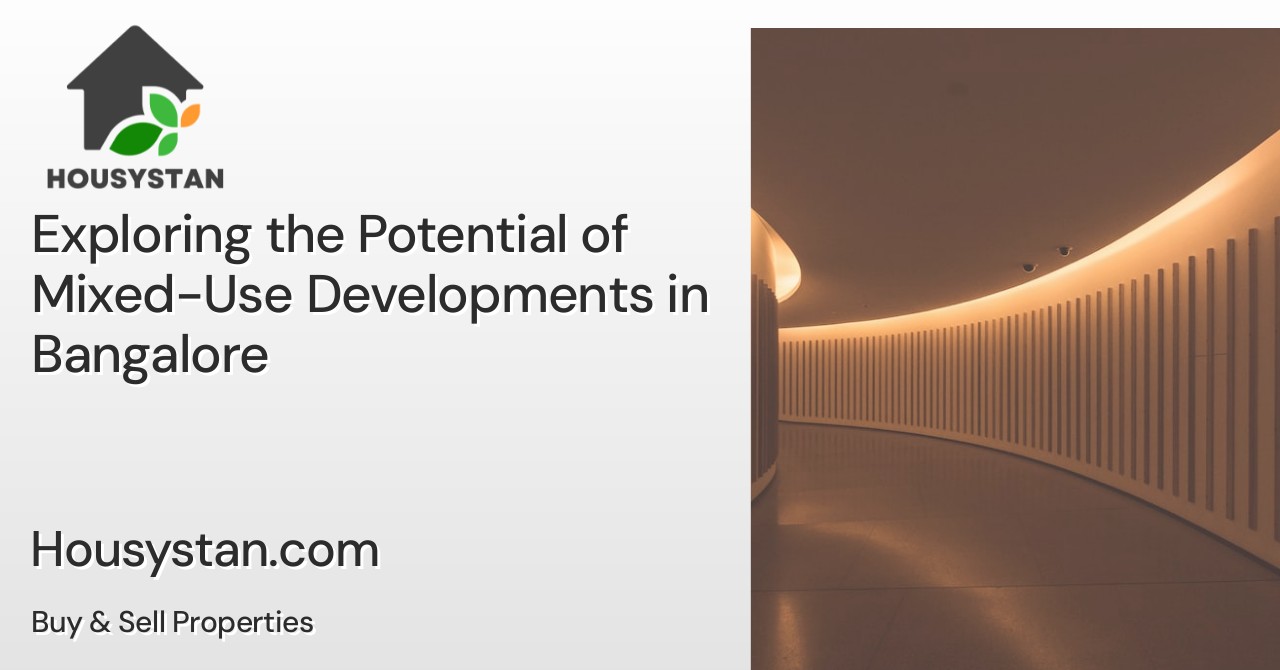Exploring the Potential of Mixed-Use Developments in Bangalore
Read latest blogs and articles from Housystan

The Information mentioned here was last updated on:
29/1/2026Exploring the Potential of Mixed-Use Developments in Bangalore
Bangalore, often dubbed as the "Silicon Valley of India," is a city that is constantly evolving. As the urban landscape changes, the need for innovative urban planning solutions has become more pressing. One such solution gaining popularity is mixed-use development. This blog post explores the potential of mixed-use developments in Bangalore, examining their benefits, current trends, and future opportunities.
What Are Mixed-Use Developments?
- Verified Tenants/Buyers
- Unlimited Property Listing
- Zero subscription/charges fee
Mixed-use developments are urban projects that combine residential, commercial, cultural, and sometimes industrial components, all within one integrated space. The goal of mixed-use developments is to create a community where people can live, work, and play without needing to travel long distances. This concept is particularly appealing in bustling metropolitan areas like Bangalore, where traffic congestion is a significant issue.
Key Features of Mixed-Use Developments
- Integrated Living: Residents can enjoy housing that is conveniently located near workplaces, shops, and leisure facilities.
- Diverse Amenities: These projects often include parks, shopping centers, gyms, and sometimes educational institutions.
- Sustainable Design: Many mixed-use developments prioritize eco-friendly building practices and green spaces.
- Community Focused: These developments aim to foster a sense of community by encouraging interaction between residents and visitors.
The Rise of Mixed-Use Developments in Bangalore
Bangalore's rapid urbanization has led to increased demand for housing and commercial spaces. This urban pressure has made mixed-use developments an attractive alternative. Developers and urban planners are keen on leveraging the benefits of such projects, making them a popular choice for new investments in the city.
Key Drivers of Mixed-Use Developments
1. Economic Growth: As Bangalore continues to attract global businesses, there is a growing need for spaces that can accommodate both residential and commercial needs.
2. Urbanization: With an ever-growing population, the demand for comprehensive urban solutions is high.
3. Sustainability Goals: Mixed-use developments offer a sustainable approach to city planning by reducing urban sprawl and promoting efficient land use.
4. Government Policies: Supportive infrastructure policies from the government further encourage the development of such complexes.
Benefits of Mixed-Use Developments
Mixed-use developments are not just a trend; they offer tangible benefits for cities, developers, and residents alike.
For Cities
- Reduced Traffic Congestion: By minimizing the need to commute long distances, these projects can alleviate traffic woes.
- Efficient Land Use: Mixed-use projects make the best use of available land, which is crucial in a land-scarce city like Bangalore.
- Economic Boost: With high pedestrian traffic, these areas often become economic hubs, attracting businesses and increasing job opportunities.
For Residents
- Convenience: Access to essential services and entertainment close to home improves quality of life.
- Community Living: These developments create vibrant communities that foster social interaction.
For Developers
- Increased Demand: The multi-faceted appeal of mixed-use developments can lead to higher property values and lower vacancy rates.
- Brand Image: Developing such spaces can position developers as leaders in innovative urban solutions.
Current Trends in Bangalore
Bangalore is already home to several successful mixed-use developments that showcase the potential of this concept. Areas such as Whitefield and Hebbal have seen significant growth in mixed-use projects, driven by the influx of IT companies and professionals.
Popular Mixed-Use Projects
- RMZ Ecoworld, Sarjapur Road: A dynamic space offering offices, retail outlets, and residential units.
- Mantri Square Mall, Malleswaram: One of India's largest malls, integrating shopping, entertainment, and residential properties.
- Brigade Gateway, Rajajinagar: Includes apartments, a hotel, a hospital, school, and the popular Orion Mall.
These projects serve as models for future developments across the city, highlighting the synergy between workspaces, living areas, and recreational zones.
Challenges and Considerations
Despite their benefits, mixed-use developments in Bangalore do face challenges. Addressing these obstacles is crucial for the successful implementation of such projects.
Infrastructure Stress
The surge of mixed-use developments can strain existing infrastructure. Efficient planning and investment in public transportation and utilities are essential to accommodate the increased demand.
Zoning Regulations
Navigating zoning laws and obtaining approvals can be a lengthy and complex process. Streamlining these procedures would facilitate smoother development of mixed-use projects.
Affordability
While mixed-use developments offer many advantages, ensuring affordability for residents is a concern. Developers must balance high-quality amenities with price points accessible to a broader demographic.
Future Opportunities
The future of mixed-use developments in Bangalore looks promising. As the city continues to expand and innovate, these projects present unique opportunities for sustainable growth.
Tech-Driven Solutions
By incorporating smart technology, mixed-use developments can optimize energy use, enhance security, and provide seamless connectivity, making urban living more efficient.
Focus on Green Spaces
With growing environmental awareness, future developments are likely to prioritize green spaces and sustainable practices, offering a healthier living environment in urban settings.
Enhanced Community Spaces
Creating spaces that encourage community engagement, like art centers, open-air theaters, and cultural spaces, will enhance the social fabric of these developments.
As Bangalore continues to adapt to the demands of the 21st century, mixed-use developments hold the potential to reshape the city’s skyline. By blending innovative design with practical functionality, these projects can lead the way toward a more connected and sustainable urban future.
-